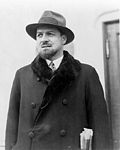Italian settlers in Libya (even called Italian Libyans) typically refers to Italians, and their descendants, who resided or were born in Libya.
Italian heritage in Libya can be dated back to Ancient Rome, when the Romans controlled and colonized Libya for a period of five centuries prior to the fall of the Roman Empire and its takeover by Arab and Turkish civilizations. But predominantly Italian heritage in Libya refers to modern-day Italians. In 1911, the Kingdom of Italy waged war on the Ottoman Empire and captured Libya as a colony. Italian settlers were encouraged to come to Libya and did so from 1911 to the outbreak of World War II.
In Libya, the Italians in less than thirty years (1911-1940) built significant amount of public works (roads, railways, buildings, ports, etc.) and the Libyan economy flourished. Italian farmers cultivated lands that were lost to the desert for centuries and improved Italian Libya's agriculture to international standards. Libya was considered the new "America" for the Italian emigrants in the thirties, substituting the United States.
The governor Italo Balbo is attributed with the creation of modern Libya in 1934, when he convinced Mussolini to unite the Italian colonies of Tripolitania, Cirenaica and the Italian Libyan Sahara in one single country named "Libia" in Italian.
The Italians in Libya numbered 108,419 (12.37% of the total population) at the time of the 1939 census. They were concentrated in the coast around the city of Tripoli (they constituted 37% of the city's population) and Bengasi (31%). (Read more...)
